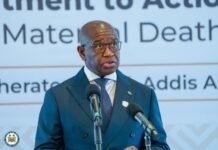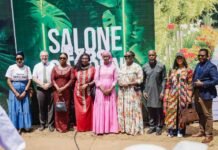By Foday Moriba Conteh
The International Federation of Journalists (IFJ) and its Pan-African counterpart, the Federation of African Journalists (FAJ), have lauded a groundbreaking decision by the African Union (AU) Peace and Security Council (PSC) to prioritize the protection of journalists across the continent. The decision, made on September 2, 2024, places journalist safety at the forefront of AU security discussions for the first time.
During the PSC’s 1230th meeting, chaired by Ambassador Churchill Ewumbue-Monono, Permanent Representative of Cameroon to the AU, the Council addressed pressing concerns regarding the safety of journalists working in conflict zones and the critical need for access to information. This move marks a significant step forward in safeguarding the Freedom of the Press in Africa, an issue long championed by the IFJ and FAJ.
At the meeting, FAJ President, Omar Faruk Osman, provided a detailed briefing to the 15-member PSC, highlighting the dangers journalists face across Africa, especially in conflict regions. These dangers include harassment, arbitrary arrests, attacks and even killings. Omar Faruk Osman emphasized that female journalists often face additional challenges, while restricted access to information disproportionately affects African citizens during crises.
Ambassador Bankole Adeoye, AU Commissioner for Political Affairs, Peace and Security, reinforced this, stating that attacks on journalists are tantamount to attacks on all African citizens. He stressed the importance of collective efforts to protect the rights of journalists, noting that freedom of expression is essential for Africa’s development.
Honourable Ourveena Geereesha Topsy-Sonoo, Special Rapporteur on Freedom of Expression and Access to Information in Africa at the African Commission on Human and Peoples’ Rights (ACHPR), also contributed to the discussion, highlighting the ACHPR’s initiatives to protect journalists through key resolutions and direct communication with AU member states.
In a press statement following the meeting, Ambassador Ewumbue-Monono reiterated the Council’s commitment to enhancing the safety of journalists, commending their role in promoting democracy, freedom of speech and political accountability. The Council also emphasized the importance of journalists in providing early warnings that can help prevent conflicts.
The PSC condemned the rising violence and threats against journalists, particularly in conflict areas and paid tribute to those who lost their lives in the line of duty. The Council called on AU member States to hold accountable those responsible for such crimes.
Furthermore, the PSC encouraged member States to develop and implement national strategies that align with AU guidelines on journalist safety. These include the Johannesburg Principles on National Security, Freedom of Expression and Access to Information (1995), the AU Model Law on Access to Information (2013),and the Declaration of Principles on Freedom of Expression and Access to Information in Africa (2019).
The PSC called for the establishment of a Working Group on the Protection of Journalists to improve coordination and safety mechanisms. It also requested the AU Commission to develop strategies that integrate media safety into military operations, ensuring compliance with international humanitarian law.
The Council expressed concern over the rise of misinformation and disinformation, particularly on digital platforms and called for strengthened efforts to combat those issues while protecting media infrastructure in conflict zones.
Reacting to the decision, FAJ President Omar Faruk Osman described the AU’s move as a “beacon of hope” for journalists across the continent, stating, “This is a transformative step towards creating a safe environment for media professionals who risk their lives to expose the truth.” he reaffirmed the FAJ’s commitment to ensuring these decisions are implemented.
Anthony Bellanger, General Secretary of the IFJ, echoed this sentiment, praising the AU’s decision as a “game-changer for press freedom in Africa.” He emphasized that the Council’s action reflects a significant policy shift aimed at curbing impunity for crimes against journalists.
As the AU transitions from policy-making to implementation, the IFJ and FAJ pledged to continue collaborating with the AU Commission, PSC, ACHPR and other relevant bodies to ensure that Africa becomes a safer place for journalists. This bold step signals the AU’s deep commitment to defending democracy, freedom of expression and access to information across the continent.
For more information, contact the IFJ at +32 2 235 22 16.
The IFJ represents over 600,000 journalists in 146 countries.




